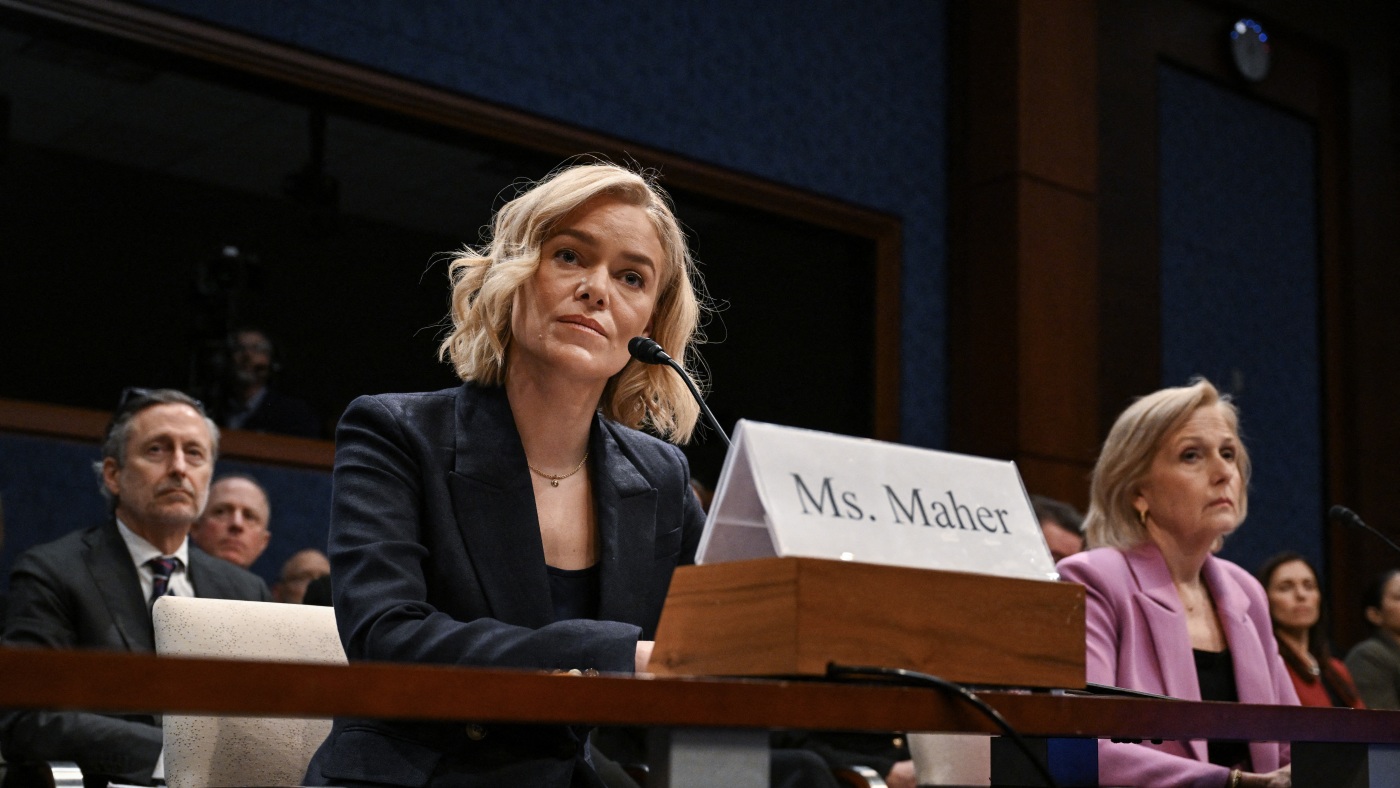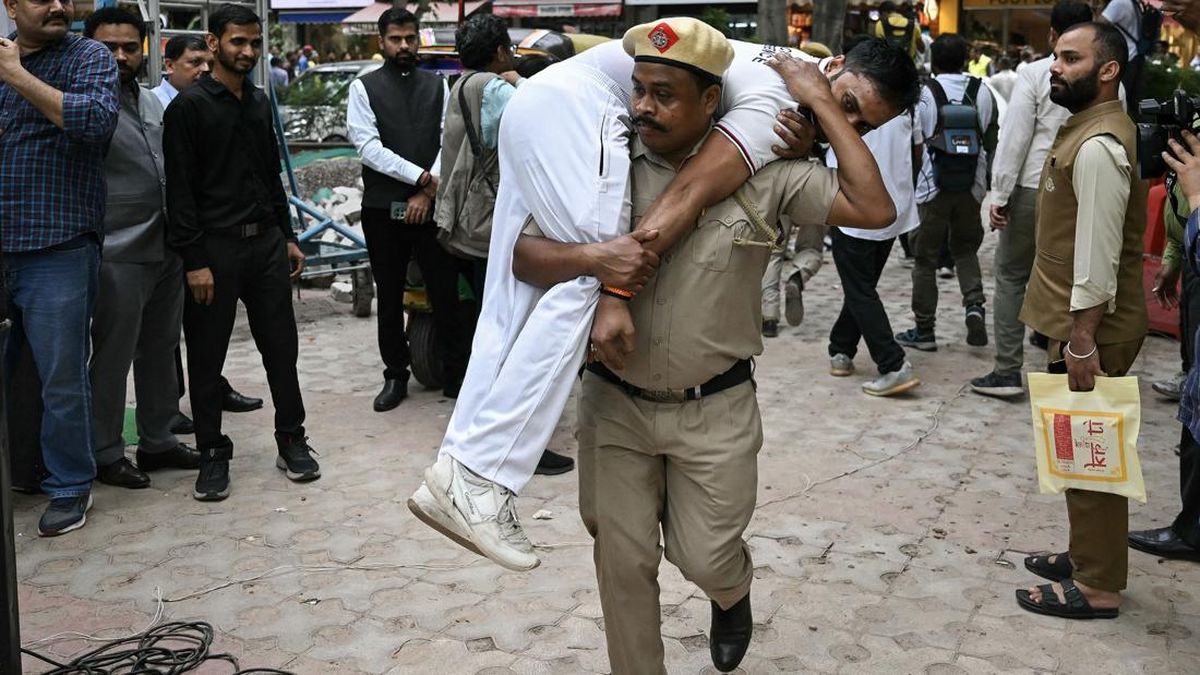
Montana State Hospital in Warm Springs, Montana is the state's only psychiatric hospital for adults. Mental health advocates say it's too hard to get someone committed to the hospital, and patients are discharged too soon, without a long-term treatment plan — which means they often end up homeless again. Aaron Bolton/Montana Public Radio hide caption
toggle caption
Aaron Bolton/Montana Public Radio
When L tells the story of her mom — and how she's stuck in a repetitive cycle of mental health crises and bouts of homelessness — she refers to a thick stack of papers and notes she's accumulated along the way.
L has spent more than a year trying to navigate Montana's mental health system, searching for anyone who could help her mom manage her symptoms and achieve enough stability to get off the streets and into a permanent home.
Her mom, K, is 65 and has been homeless in Missoula, Montana for the last eight years. Because of schizoaffective disorder, she experiences severe mood swings and delusions. Another symptom is anosognosia, which means she doesn't understand that she has a mental health condition, and because of that often refuses treatment.
Her daughter, L, asked NPR to only identify them by their first initials because of the stigma of severe mental illness — and to protect K's ability to get housing.
In late 2023, L uprooted her life in Colorado to move back home to Missoula. Her mission was to help her mom regain mental health services and eventually find a place to live.
Missoula is a mountain town, and a destination for outdoor enthusiasts. But the people who live on its streets, like K, must contend with cold winters and scorching summers.
K's mother was surviving, but she wasn't taking her psychiatric medications. Her symptoms were too disruptive for L to take her into her own home. L, an only child, says she still has trauma from growing up with her mom's mental illness.
"It's pretty painful on cold nights to have to not let somebody in because it will deteriorate your whole mental health and stability," L said, choking up with emotion. Her two dogs hopped up on the couch to comfort her.
K used to live a stable life
Until 2017, K was relatively stable. She had been renting out a basement apartment, L said.
But in 2017 Montana cut its Medicaid budget. Among the changes, funding for case management was roughly halved, according to KFF Health News.
K lost her case management services. She no longer had someone to help her navigate the health system, and crucially, ensure that she stayed on track with medications.
Then K's apartment was sold. There was no one who could help her find a new place to live. She eventually stopped taking her medications and fell into homelessness.
While she lived on the streets, K's mental illness spiraled out of control. She sometimes stayed in shelters but often got kicked out because of her symptoms and behaviors. When she did take her prescribed medications, she experienced side effects such as incontinence — another disqualification from shelters.
When K tried to find spots to sleep outdoors, Missoula police officers sometimes issued trespassing violations. She landed in the local jail, hospital emergency rooms, and was sometimes sent to Montana's only state-funded psychiatric hospital.
Montana has just one psychiatric hospital that can stabilize people
This cycling in and out of institutions became routine, but K was never in any one place long enough to get her symptoms under control.
Too frequently, Montanans like K never get the long-term help they need. But a new round of major spending slated for the state's mental health system may offer some hope.
In 2023, Montana legislators agreed to invest $300 million to shore up its struggling behavioral health care system.
The push for more funding came after several shocks to the system.
In 2022, the state's only public psychiatric hospital lost its federal certification, after several patients died. That meant the hospital was no longer eligible for Medicaid payments, straining its budget as it continued to grapple with staff shortages and poor management.
In addition, private mental health providers shuttered facilities and ended services, citing the 2017 Medicaid cuts and financial pressures stemming from the pandemic.
Local emergency rooms and law enforcement saw the effects. People with mental illness who had been arrested were spending months stuck in local jails because they were too sick to stand trial.
The psychiatric hospital is now trying to regain federal funding, and legislators are pushing a bill that would allow them to visit the troubled facility.
As for the $300 million investment, the money is being disbursed over several years, following recommendations from a special commission. Montana Gov. Greg Gianforte recently forwarded 10 of those recommendations to the Legislature, which will decide which ideas are funded.
When there's nowhere to send the most difficult patients
When L first moved back to Montana, she quickly saw the gaps in services for people like her mom. While she looked for help, she met social worker Theresa Williams.
Williams leads Missoula County's Crisis Intervention Team, which takes on tough cases like K's.
"We're talking years and years and years of this particular individual falling through the cracks of our community," Williams said.
In K's case, she needs housing to have any hope for long-term mental stability, said Williams.
Working with L, Williams started coordinating with mental health providers, county officials, the local hospital, law enforcement and others.
They had some success: K regained case management services. But she still refused her medications and continued to get kicked out of Missoula's homeless shelters.
Williams recommended that K be admitted to the state psychiatric hospital, where she could be involuntarily medicated.
Williams still worried the hospital would be a "band-aid" because there was still no clear path afterwards for housing for K, in order to break the "crisis cycle." Still, K's hospital stay bought them a little bit of time to find a roof and four walls for K.
More services for people in crisis on the horizon
K's situation reveals why Montana needs to bolster spending across the state, and not just at the psychiatric hospital, mental health advocates say.
Some of the state funds are already flowing to local communities, which will reopen crisis facilities and group homes, and bolster mobile crisis teams, among other near-term fixes.
"I have hope that we turned the corner," said Republican Montana State Sen. John Esp, a commission member. "At least we recognize all throughout the state that those people dealing with serious mental illness need treatment, they need community support, those families need support."
L had hoped K would stabilize after she got to the state hospital, but hospital staff gave her the wrong medication. She went back to being homeless.
Homeless outreach workers, and her daughter L, spent months trying to convince K to take her medications. Eventually, she agreed. Since then, K has been able to stay overnight in the homeless shelter more often, which means she has fewer run-ins with police and fewer trips to the ER.
"My mom does have some sort of a life back," L said.
But permanent housing remains elusive, and L knows her mom could go downhill again without a stable place to live.
State investments might not be enough without housing
Advocates are watching state legislators to see if they'll approve the next round of reforms recommended by the commission. Some of those reforms will require additional long-term funding.
So far, the Republican majority in the Montana Legislature have approved the construction of a new "step-down facility" that will house and treat patients discharged from the Montana State Hospital. These are patients who are stable, but still not well enough to return to their communities.
Lawmakers also support funding for new crisis-care facilities that will be open 24 hours a day.

Missoula County Attorney Matt Jennings testifies about legislation to reform Montana's mental health system. Jennings has advocated for more services that would divert people from the local jail if they are too mentally ill to stand trial. Jennings also wants more funding for supportive housing in order to stop people like K from cycling between hospitals, jails and the streets. Shaylee Ragar/Montana Public Radio hide caption
toggle caption
Shaylee Ragar/Montana Public Radio
Those local reforms could help people like K when they're experiencing an acute psychiatric crisis. But lack of access to housing could still be a barrier to their long-term stability and recovery.
"These people do get out of a hospital setting, get out of a step-down facility and they go back into a homeless situation here in Missoula, Billings, or somewhere else in the state — and then the cycle repeats itself because there isn't a long-term plan," said Missoula County Attorney Matt Jennings.
The state has already set aside nearly $16 million to open more group homes, adding an estimated 400 beds. However, only some of those beds will be designated for adults with severe mental illness.
Congregate settings, like group homes, don't work for every patient, Jennings added.
States struggle to balance short- and long-term needs
In Missoula County alone, there are at least 100 people like K who are caught in the crisis cycle, according to Jennings. Montana will have to find more ways to house those with severe mental illnesses, he said.
"If you just get someone stable housing, you can watch how their mental health, the benefits go up overnight," said Ben Miller, a psychologist and professor who studies systemic mental health reform.
Policymakers in Montana and in other states sometimes focus mental health funding on short-term crisis services, rather than things that can provide long-term stability, like housing, Miller said.
But he recognizes that achieving a balance between crisis care and long-term solutions is tough.
"Our communities are suffering because we're not doing both very well," he said.
L hasn't been following the reform process closely, but some of the recommendations do give her hope.
But she knows that as long as permanent housing continues to elude K, she remains vulnerable.
Recently, K agreed to join some waiting lists, for openings in group homes and assisted living facilities. If a bed opens up, L hopes her mom will agree to take it.
The entire experience has eroded her own mental health, L said. She recently moved out of state.
"I will always help her moving forward, but I also have to put myself first, too, because I don't have anyone else doing that," L said, wiping tears from her eyes.
This story comes from NPR's health reporting partnership with Montana Public Radio and KFF Health News.

 2 months ago
48
2 months ago
48

















































